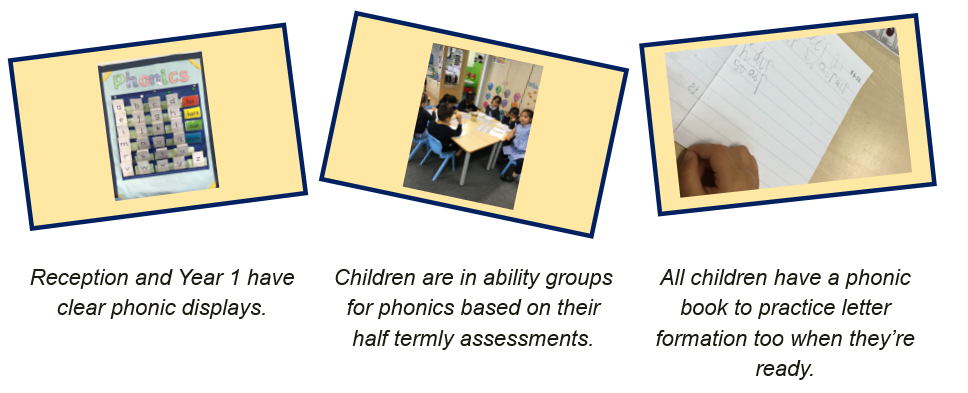Phonics
“If a child memorises ten words, the child can read only ten words, but if the child learns the sounds of ten letters, the child will be able to read 350 three-sound words, 4,320 four-sound words, and 21,650 five-sound words.” (Martin Kozloff 2002)

Intent
At All Saints’, we believe that every pupil can become a fluent and confident reader. We know that the key element of this is the early and successful teaching of phonics. The Reading Framework is clear and we prioritise early Reading within the Early Years and Year 1 classrooms by ensuring that all pupils are taught daily and tracked accordingly in order to keep up with their peers. We aim to teach pupils as quickly as possible through the Read, Write, Inc program, as we believe this will have a huge impact on the rest of their journey at school. We know that Read, Write, Inc Phonics provides Reading and Writing foundations that are needed.
In order for all pupils to pass their phonic screening test in June, we intend that all pupils are taught and can apply all the phonetic sounds by the end of May in Year 1. By the time our pupils leave Year 1, we envisage that they will be competent readers who can decode phonic books and engage in discussions about what they have read. Once our pupils have completed the phonic programme, it is our intention that they will be able to apply their reading skills in order to access any subject within our curriculum.
Implementation
The RWI programme is of high priority for EYFS and Year 1. Therefore, Phonics is taught daily and is in line with the amount of time referenced in the Reading Framework. We ensure that by the end of EYFS pupils are taught for an hour a day during their Phonic session. All children are closely monitored through a half termly RWI assessment. Children in Year 1 complete at least 2 practice phonic screening papers over the year too. All children are taught in ability groups based on the assessments that are completed half termly. If we notice that a child is standing out within their group, then we will complete their assessment immediately and move groups accordingly. All staff are trained on our phonic programme through watching our confident teachers, gaining support from the RWI support videos and team teaching. For those children not making progress, they will be placed in an intervention group or receive 1:1 phonics from either a TA or teacher. Phonics is led and monitored by the Assistant Head for EYFS and KS1. Throughout the year, parents are invited in for workshops, learning walks are undertaken and support is given to teachers, parents and pupils when needed. Through close monitoring we ensure that children keep up with their peers and hit the national standard in Year 1 and Year 2. We ensure that any child engaging with phonics has a phonetic decodable book that allows the pupil to practice the phonics that they are being taught in school.
Within a lesson, children are taught many key skills in order to become a successful young reader:
- decode letter/sounds correspondences quickly and effortlessly, using their phonic knowledge and skills
- read ‘tricky’ (red words) on sight
- understand what they read
- read aloud with fluency and expression
- write confidently, with a strong focus on vocabulary and grammar
- spell quickly and easily by segmenting the sounds in words
- acquire good handwriting
Impact
The impact of our clear, organised, and systematic programme has led to the data shown below. The scheme is followed consistently and monitored by leaders within our school, and this has ensured that we have been able to continue to achieve above national standard in the Phonic Screening in Year 1 and Year 2. This has then led to 70% of the cohort in Year 2 achieving national standards in Reading. The impact has then been seen throughout KS2 as our pupils have the basic decodable skills to tackle reading in all curriculum areas. This has then led to our school achieving well at the end of KS2 in reading.
Information for Parents and Resources
Below you will find a selection of phonics resources used widely in school. They provide the framework for the phonics skills and knowledge your children will develop and become familiar with. Feel free to use these to compliment their in school learning. Click the links to view or download.
Information for parents - Read Write Inc.
Reading the digraphs with your child
Read Write Inc Handwriting Phrases
Phonics Data
Year 1 Phonic Data:
| 2021-2022 | 2022-2023 | ||
|---|---|---|---|
|
School Data: 90% |
National Data: 75% |
School Data: 85% |
National Data: TBC |
Year 2 Phonic Data:
| 2021-2022 | 2022-2023 | ||
|---|---|---|---|
|
School Data: 93% |
National Data: 87% |
School Data: 97% |
National Data: TBC |
